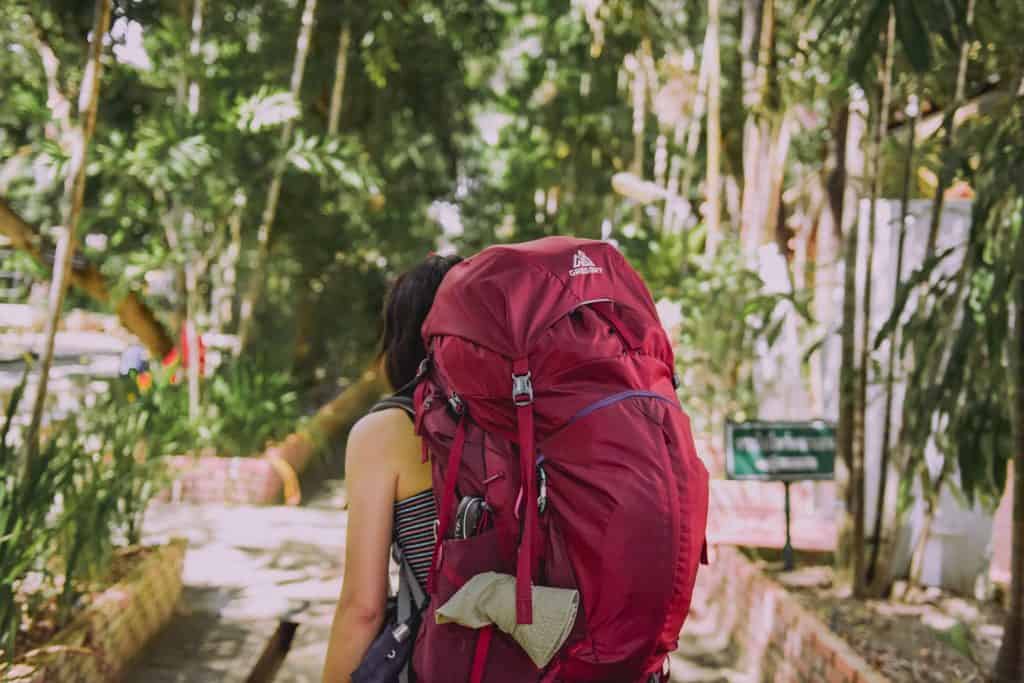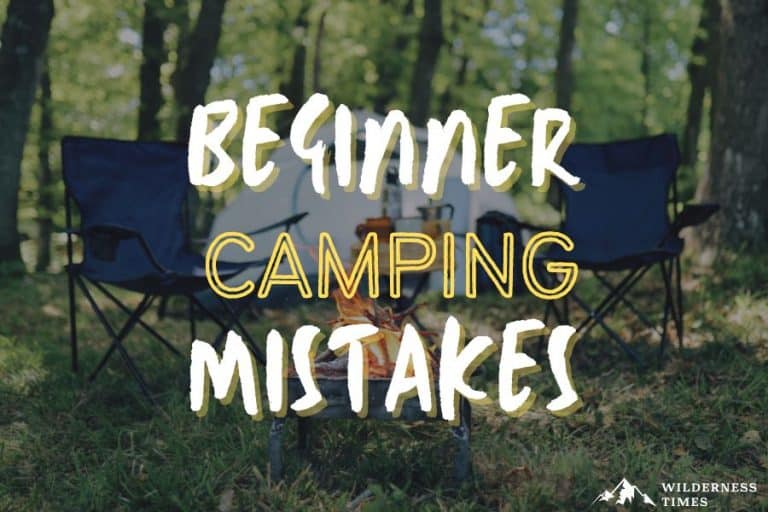If you’ve never been camping before, you might feel a little intimidated.
I’m here to tell you – that’s okay!
Everyone’s first camping trip is bound to be a learning experience. It’s highly likely that you’ll mess something up, or that your excursion won’t be picture perfect.
But, that’s no excuse to skip the trip and stay inside. Instead, read this article to learn what most beginner campers get wrong.
Table of Contents
ToggleBeing Tardy
The first time you go camping, you might be tempted to leave for the campsite in the evening, to make it there just in time for a delicious camping dinner. Maybe you’ve got things to do during the day, or packing takes longer than expected. Perhaps one of your little ones has an “accident” that takes hours to clean up.
Either way, there are a million excuses for arriving at the campsite late.
My suggestion is to show up early – no matter what.
This is doubly important when you want to go hiking. No one wants to hike in the dark. Plus, some areas have rain in the afternoon, making hiking that much more dangerous.
On top of that, it’s pretty challenging to set up a tent in the dark. Pitching a tent is hard enough as it is (with all the poles and such). It’s even worse when you have to do it while holding a flashlight in your mouth.
Get to the campsite early so you can avoid this mess. And make sure you have a plan for setting up camp when you arrive.
Over-Packing

Throughout this article (and on the rest of my site), you’ll notice I recommend a lot of gear. That’s because there’s a ton of items you could buy, depending on your situation, goals, and activities.
However, don’t feel the need to buy every single shiny object you see. Sure, there are some necessities, like the Ten Essentials. But, unless your name is Bear Grylls, there’s no reason to spend thousands of dollars on fancy camping equipment.
Most people can get by with a tent, a sleeping bag/pad, emergency supplies, food, and a stove. That’s it. You don’t really need fancy stuff like backpacking knives or walkie talkies – that comes later when you get bit by a camping bug.
Beginners should be doubly prudent about their spending. It’s possible you go camping and absolutely hate it. Don’t spend all of your money on gear that you’re not sure you’ll use.
Under-Packing
On the other hand, it’s also possible for you to under-pack.
Maybe you don’t bring enough water, food, or you think you’ll be able to sleep on the ground without a pad (please don’t try this).
Deciding how much gear to buy is definitely a balancing act. Over-pack, and you’ll waste your money. Under-pack and your camping trip will be miserable. So, juggle the two to find how much gear you actually need. This is something you’ll also learn with experience, so don’t worry if you miss the mark on your first trip.
Also, you can prevent financial blunders by using these tips to save on camping gear.
Mismatching Your Tent Size
One of the greatest outdoor travesties is how tent manufacturers designate their tents. Walk into any gear store, and you’ll see that tents are rated by how many people they can fit. You’ll see 1-person tents all the way up to 12-person tents.
At first glance, you might think that a 4-person tent would be able to fit…four people. This is correct, but only if those four people want to be packed to the gills, sleeping elbow-to-elbow.
That’s why I recommend sizing up two people. This breathing room allows you to stretch your legs and have additional room for your backpacks.
For example, don’t expect your “2-person tent” to be sufficient space for you and your spouse. In that case, a 4-person tent would be a much more suitable choice (here are some of my top picks). This way, you don’t end up sleeping like sardines on your first camping trip.
Cooking On The Campfire
One of the biggest beginner campfire mistakes is depending on cooking on the campfire.
If you’ve never built a campfire before, you might think it’ll be easy. All you gotta do is throw a bunch of wood down, light a few matches, and throw some steaks down…right?
Wrong. Believe it or not, building a campfire is hard! The first time you erect a campfire, it’ll likely be the size of a chihuahua.
I hate to break it to you, you’re not going to cook the world’s perfect steak on such a small (and volatile) fire. Even if the steak does cook, it’ll probably be fried on the outside and raw on the inside.
You can fix all of this by bringing a lightweight camping stove. These portable tools allow you to cook like a pro without needing the whole kitchen.
Wingin’ Where You’re Headed
A typical line I hear from aggressive first-timers is that “we don’t know where we’re going…we’ll just figure it out when we get there!” Ha.
If you’re just going for a quick 2-hour hike in the foothills, sure. You might be able to “just wing it.”
However, if you’re going for a more expert hike, you’ll want to familiarize yourself with the map. You never know when the trail will become loose, or the markers will become less apparent. That being said, make sure you know how to read them. Getting lost is much more common.
That’s why it’s worthwhile to become proficient with a compass. This skill will only take a few minutes to learn but can seriously save your butt.
If you’re camping, you’ll also want to pick where you’re setting up camp.
Many parks have different policies on where you’re allowed to camp, and some aren’t even open at all at certain times of year.
Prepare yourself accordingly, so you don’t end up like this guy (skip to 1:46 for a good laugh):
Banking On Credit
This might seem a little old-school, but make sure you pack some cash with you. Some national parks are still behind the times and don’t accept credit cards.
In that case, make sure you bring some cash with you to handle your entrance fees and expenses.
It can also be used to barter some bug spray off your next-door neighbor in case you forget something.
Forgetting To Test Equipment
Here’s a not-so-uncommon story. You bring your gear, unpack your bag, and spend the next 3 hours fumbling through instructions.
That is NO way to spend your precious vacation time.
Before leaving for your trip, make sure you familiarize yourself with your gear. Take items out of their boxes and give them a test drive. That way you’re an expert by the time you hit the park.
The #1 piece of equipment to test is your tent. Even for pros like me, pitching a tent is not easy. This task becomes 100x harder when the wind is blowing, the dogs are barking, and the kids are running around like banshees.
So, make sure you test out your gear before you leave. Check the batteries in your flashlights, pump some air in your football, and make sure you’re ready to roll.
Freezing To Death
If you’ve never slept outside before, you might not know how cold it gets at night.
Even if you know how cold it is, many people underestimate how cold it gets when you sleep outside for eight hours.
It does get cold. Thankfully, laying on the clothes is an easy fix. All you have to do is make sure you pack extra hoodies and sweatpants to keep you and your loved ones toasty at night.
On top of that, there are plenty of cold-weather sleeping sacks available that will keep you much, much warmer than a few blankets. Whatever you do, make sure you’re not trying to be Mr. Tough Guy sleeping in a T-shirt and boxers. You will get cold!
Feeding The Birds (Or Bears)
When you’re a beginner, the last thing you want to do is get woken up by bears.
To make sure you keep you and your family sleeping safe ‘n’ sound, make sure you put away your food at night. At the least, store everything in Ziploc bags. Hide them in plastic bins or even inside your car to prevent the smell from coming out and luring in predators.
There’s also this classic technique of hanging your food in the air so no one can get to it. Watch the video above for more information on how to accomplish this.
Just in case you do find some furry creature walking up to your campsite, there are many ways to protect yourself from attacks.
Ignoring Worst-Case Scenarios
You’ve got your food, snacks, a tent, and gear, but are you prepared for worst-case scenarios?
Although camping is enjoyed by millions, there are still tons of negative situations you can get yourself into. You could get lost, sunburnt, cut, bit by mosquitos, the list is endless.
Thankfully, there’s a tried & true list of must-haves that can save you from any dire circumstance.
Referred to as “The Ten Essentials,” they are:
- Navigation
- Sun Protection
- Insulation
- Illumination
- First-aid
- Fire
- Tools
- Food
- Water
- Shelter
Motivated campers who want to learn more about this packing checklist can click here.
Delaying Dehydration
Last but not least, bring plenty and plenty of water. Without the tap at your disposal, it’s a lot harder to get water. Unless you’re ready to drink pond water, bring a few gallon jugs to keep you prepared.
This is even more crucial if you’re doing physical activities like hiking. Sweating excretes so much water, it’s always a good idea to bring a few extra gallons. Grocery stores sell gallons for about a dollar, so really, there’s no excuse.
Have Fun!
Above all of these tips, don’t forget to have fun!
Camping can be overwhelming but follow these tips, and you’ll definitely enjoy yourself.
Don’t get caught up in the noise. Prepare yourself, pack your gear, and go make memories.
More Beginner Camping:


